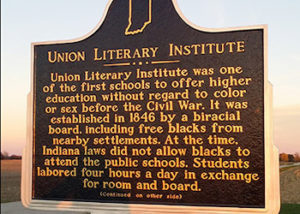
ULI plaque
*The Union Literary Institute opened its doors on this date in 1846. This was an early American establishment of formal education for Blacks in a non-slaveholding state.
The Union Literary Institute was a unique school conceived during racial prejudice and strife. Anti-slavery Quakers founded the Institute with free Blacks who lived near the Greenville Negro settlement (aka Longtown) that straddled the Indiana-Ohio state line in the early 1800s. The Institute made no distinction for race, color, or sex at a time when law prohibited Black children from attending public school in Indiana, and interracial education was virtually unheard of before the American Civil War.
Union Literary Institute schoolhouse was originally a two-story, hewed-log building and a two-story frame building. It was constructed on land donated by Benjamin Thomas, a wealthy Wayne County Quaker. James Moorman contributed an additional eighty acres, of which forty acres lay in Darke County, Ohio. The hewed-log schoolhouse was about twenty-four feet square and contained a classroom on the first floor and a library accessible by a ladder on the second floor. The frame structure was completed in 1846 and accommodated the principal, the superintendent, their families, and about fifty students who boarded at the school.
Nathan Thomas was the first superintendent, and his wife Pamela was the first matron. The two-story brick schoolhouse was built in 1860. Sadly, only the first floor of this historic structure, along with some of the upper floor structures, remains today. The Union Literary Institute Planning Society believed this structure should be preserved and restored as part of local and national history. Some prominent men were educated at the Institute and went to the world to fill places of honor.
In Dayton, Ohio, a public housing complex is named for Desoto Bass, who was born in the settlement and educated at the ULI. He served as the Pastor of the First Wesleyan Methodist Church (Dayton, Ohio) from 1895 until he died in 1928. He helped form the Colored Ministerial Alliance and brought bags of coal to needy people. Dayton’s, the nation’s first public housing complex, is named in his honor.” Hiram R. Revels, born in North Carolina, studied at the Institute and moved to Mississippi, where he was elected to the State Senate and later filled the unexpired term of Jefferson Davis in the U.S. Senate.
The Institute aimed to provide “for the high and noble purpose of carrying knowledge and learning within the reach of those who desire it.” This was accomplished through a boarding structure where each student worked four hours daily in exchange for room and board. The majority of the students lived nearby and traveled daily. Others boarded from as far away as Cincinnati, Ohio; Indianapolis, IN; and Mississippi and Tennessee.
Some students have escaped slaves who attended the Institute to further their education. The constitution embodied the high ideals and earnestness of the Institute’s Board of Managers. In particular, Articles 8, 9, and 10 established the Institute in a class by itself. Article 8 stated, “There never shall be tolerated or allows in the Union Literary Institution, its government, discipline or privileges, any distinction on account of Color, Rank or Wealth.”